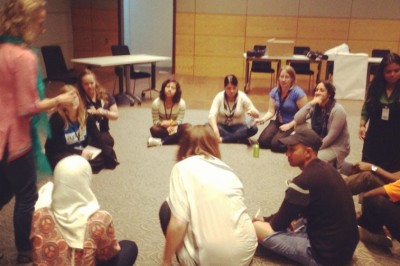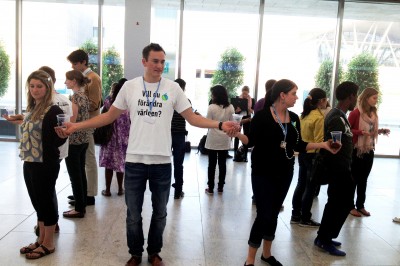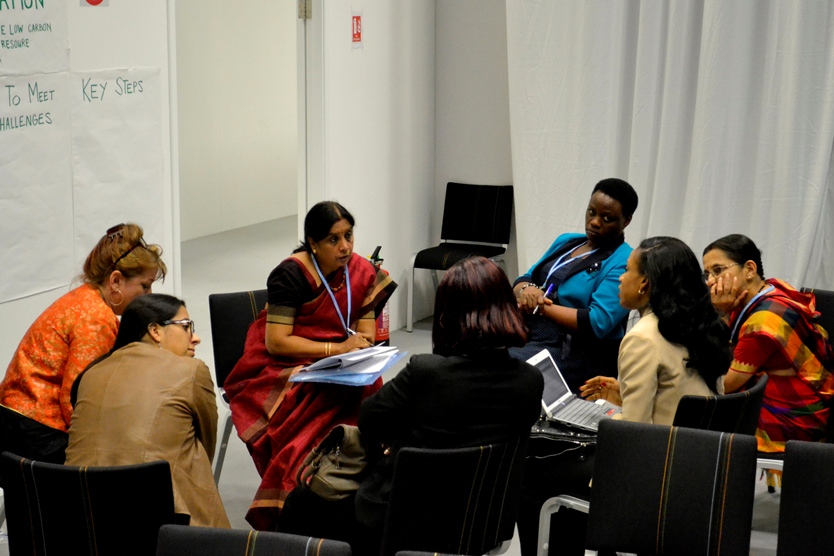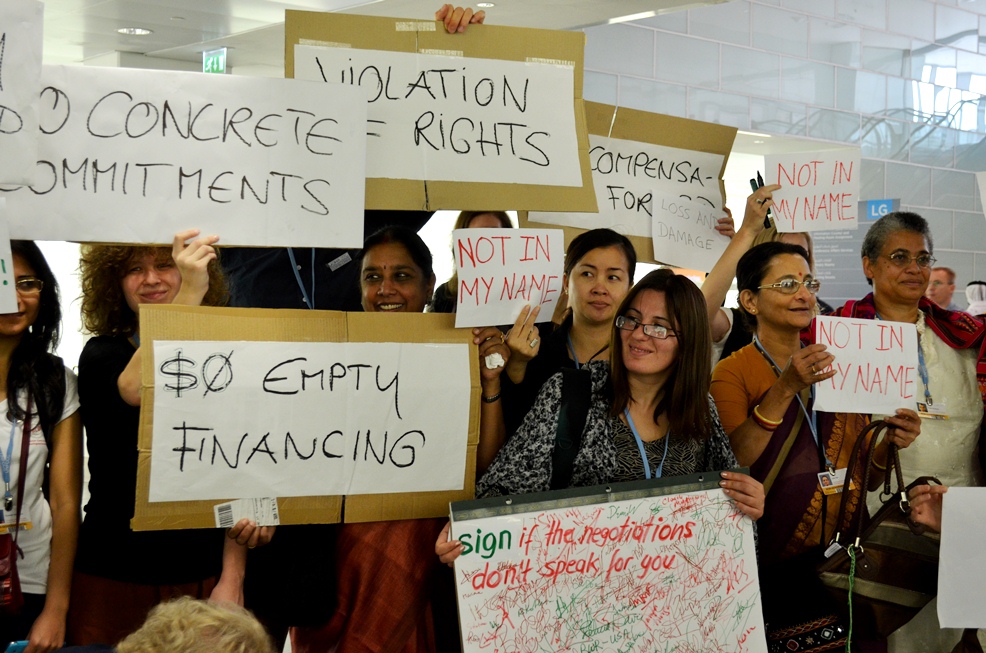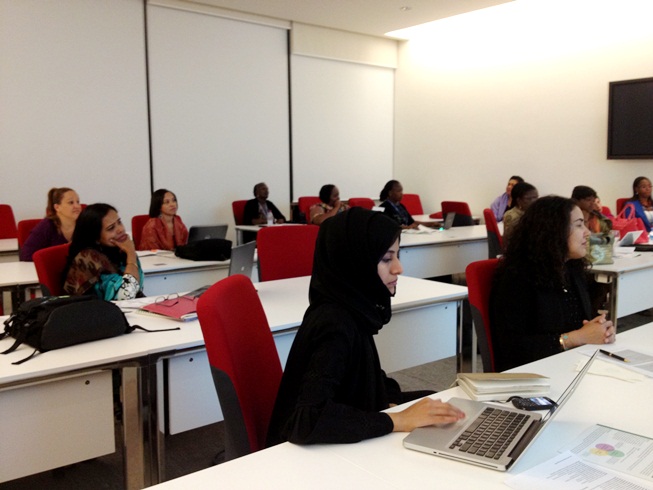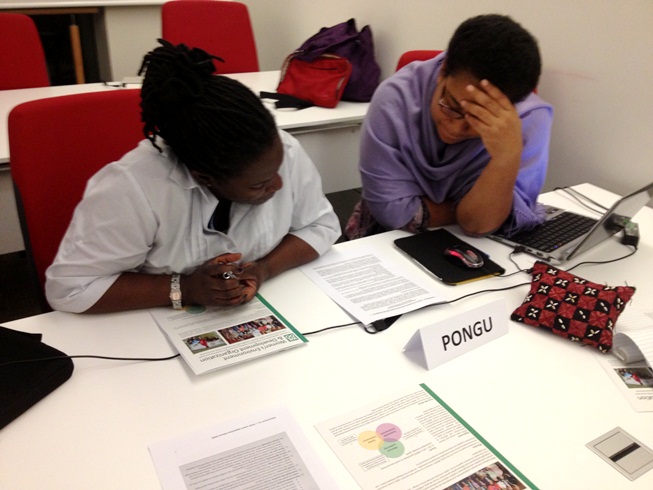by Bridget Burns, WEDO Project and Communications Coordinator. At COP18, in addition to facilitating the WDF program and WEDO communications, Bridget worked in collaboration with several individuals to establish an active youth gender working group.
The culmination of any two-week-long multilateral negotiations, particularly around a complex, urgent and global issue such as climate change, is always followed by a period of reaction and reflection. Stakeholders at every level, across sectors and issues embedded in the UNFCCC process, analyze whether or not the outcomes move us forward, keeps us treading water or cements us on a distressing and unsustainable path.
In this context, on the final day of the COP18 negotiations, while listening to and reading the first statements and press releases from Governments and civil society, I stumbled upon a piece by Kelly Rigg, Executive Director of GCCA, entitled Finding Hope in the Final Hours of the Doha Climate Conference. Quoting a speech she had delivered earlier in the week, at the launch of the UNFCCC Momentum for Change Initiative, Rigg writes, “What gives you hope? This is a question I’m often asked these days. And what I’ve come to realize is that being hopeful, in the face of so much bad news about climate change, is not something that just happens — at least not to me. It’s not a passive process, but an active one. Hope isn’t something I have, it’s something I have to go out and find.”
Hope is something you find. It’s a simple message. But when it comes to climate change- the most complex and urgent issue of our time which continually fails to receive the ambitious political will it needs- I believe it is the most important message. It’s certainly one of the key drivers of the work WEDO does to promote women’s rights and gender equality in the climate negotiations. In witnessing the innovation and change that women and men around the world are spearheading in adapting to and mitigating climate change, in recognizing that ensuring human rights and gender equality creates more just and sustainable societies, and in understanding that equitable participation of women and men at all levels of decision making results in policies and actions which reflect the rights and diverse needs of all individuals– it’s in these that we find hope in moving towards a just and sustainable world. At the most basic level, underlying all our capacity building, reports and advocacy, isn’t this what we as civil society come to the UNFCCC to do– to share our hope and help create a vision for a better future?
Perhaps I’ve gone a bit grandiose in my reflection on hope, but Kelly Rigg’s piece certainly helped shift my frame from focusing on the lack of ambition in the outcome, to the moments of hope and inspiration I found during my two weeks at COP18. Inspired by Rigg, below I share my Doha desert ‘grains of sand’, to quote from a Dan Brown novel (yes, a Nobel Peace Prize Winner would have been better, but this so aptly sums up my sentiment): “This little grain of sand has mass. A very small mass, but mass nonetheless. And because this grain of sand has mass, it therefore exerts gravity. Again, too small to feel, but there. Now, if we take trillions of these sand grains and let them attract one another to form… say, the moon, then their combined gravity is enough to move entire oceans and drag the tides back and forth across our planet.” Here are a few of the things I found at COP18, which I believe could help move the world:
1) The Power and Passion of the Youth Movement– It was noted by Rigg but deserves to be mentioned again. To quote another eminent scholar, Nirvana’s late Kurt Cobain, “the duty of youth is to challenge corruption” and at COP18, challenge they did. As someone who has been engaged in multiple youth movements since before Copenhagen, it has been amazing to watch how year after year, in the face of turbulent political strife and economic hardships across the globe, and a real lack of any ambition and movement in this process, youth movements from around the world come back with even greater passion, conviction, knowledge and ambition- to push governments to take responsibility for their future and the future of all generations to come. There were actions and campaigns, interventions and tweets across the two weeks; and late into the final hours of COP18, youth and other members of civil society asked developing country negotiators not to accept a weak deal with signs saying “We Stand With You, If No Justice, Nothing”. Among the regions of the world youth were representing, the Arab Youth Climate Movement- AYCM, a group which did not exist until this year and who came to Doha with commitment to push for leadership from countries in their region, should serve as a beacon of hope for changing tides. From holding the first march ever in Doha, to getting deported for daring to challenge the leadership of the host country, these youth showed true courage in speaking truth to power. Take these two young women from AYCM, Reem Al Mealla and Merna Ghaly—it’s clear they have the power to move the world.
[youtube OyW1LCjz-1I nolink]
[youtube cEKXyZ3fIi0 nolink]
2) The Youth Gender Working Group—Building on the above, one additional inspiring aspect of youth action at COP18 was the great collaboration on advocacy for women’s rights and gender equality. A youth gender working group has existed at earlier meetings, but this year, there seemed to be a new level of action and awareness of this as a critical issue for climate change. At a workshop WEDO delivered during the 8th annual Conference of Youth (COY), just prior to the COP18 meeting, participants pushed the issues of rights to finance and technology, impacts of disasters on women and LGBT communities, and sexual health and reproductive rights— and not surprisingly, engaged in a more progressive discussion than normally had in this UNFCCC space. Collaboration continued throughout the two weeks, with the working group holding an action to push for gender balance in the negotiations and putting out a press release. Advocate Mimi Melles of the Time is Now Campaign, wrote about some of the diverse individuals in this group in her blog. A passionate and informed generation who understands that gender equality is a prerequisite for sustainable development- they have the power to move the world.
3) The Women’s Movement—Recognized as a formal constituency of the UNFCCC in 2011 (enabling members to deliver interventions and participate in the negotiations), the Women and Gender Constituency hosted a caucus each morning of COP18, open to all participants and observers interested in promoting women’s rights and gender equality in the climate negotiations. The caucus is a diverse group of individuals and organizations, representing different regions and a variety of perspectives. But, it is very clear that we work towards a common purpose. In a process that often feels bereft of common purpose, this space served as a source of inspiration particularly in the final days, as it became evident that many developed countries were blocking progress towards an outcome. The members in the women’s caucus joined together as individuals to declare “Not in My Name”. This action was a signal to countries, that when they choose complacency in the process over saving the planet, they are not doing so in our names, they are not representing us. Representing networks of women’s organizations around the world, who every day join together in action to challenge corruption, we are part of a large and powerful movement that has worked to demand change in all spheres—the women’s movement has the power to move the world.
4) The Women Delegates Fund– Since WEDO began administering the Women Delegates Fund (WDF), a program to support and enhance the participation of women delegates in the UN Framework Convention on Climate Change (UNFCCC) process, in 2009, a key component has been networking and capacity building. At COP18, we held a WDF “Night School” on three evenings prior to the start of the negotiations for a group of 17 women delegates from 15 different countries. The training outlined the key aspects of the process, offered technical language skills and took the delegates through a mock negotiation. At least 7 of the delegates were attending their first UNFCCC meeting and there was a great sense of camaraderie and mentorship in the room, which lasted throughout the two weeks as delegates met with, coordinated and supported each other in the negotiations. As the UNFCCC has now adopted a decision that will focus on promoting the participation of women in the negotiations, Governments have shown commitment to creating a more diverse and inclusive process. This opportunity to highlight programs like the WDF and to think through innovative capacity building for further progress will help the climate process to embody and reflect the diverse needs of all individuals—and that can surely help move the world.
These are just a few of the many grains of sand I picked up at COP18, each with a mass which alone can only do so much, but which together, can move mountains. Here’s to our continued collective commitment and action to move the world!

